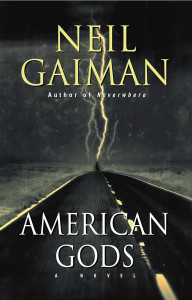 A storm is coming. One strong enough to sweep away all that has gone before, and open up the world to a new age. The age of media, the Internet, drugs, Hollywood scandals, sports stars, politics, and more. An age that has no place in it for old gods.
A storm is coming. One strong enough to sweep away all that has gone before, and open up the world to a new age. The age of media, the Internet, drugs, Hollywood scandals, sports stars, politics, and more. An age that has no place in it for old gods.
For be warned. The old gods are not dead. Not all of them. They live among us. Tricksters, whores, salesmen, immigrants, your next door neighbor, the bank manager, panhandlers, short order cooks, taxi drivers, supermarket bag boys. They own funeral parlors, dwell in their animal forms, and eke out meager existences, mostly forgotten. But they live still, drawn to America by the beliefs of generations of immigrants. Gods and demigods and devils and creatures of myth, struggling to hang on to what power they still have. Gods of the Norse, the Egyptians, the Greeks, the Celts, and so many more.
America is not a good place for gods. We’ve made our own. And now the old gods and the new gods are going to come together for the last time. There’s not enough room for them all anymore. Not in this age.
Mr. Wednesday has a plan, a cunning plan to unite the last of the old gods for one final battle.
Mr. World has a plan, a devious plan to eliminate the old gods and clear the way for a new breed.
Shadow has a plan. To get out of jail, reunite with his wife, and get his life back on track. Unfortunately, his plans are derailed. Released days early from prison, only to find out that he has no life to go back to, he accepts a job from the fast-talking, mysterious man known as Wednesday. Shadow will act as bodyguard, courier, companion, enforcer, and right hand man as Wednesday plays out an elaborate scheme. Part con man and trickster, part god, the secrets Wednesday keeps may destroy him and Shadow both.
As Wednesday’s plan unfolds, Shadow begins to realize the true depths of the intricate, deadly web he’s become entangled within. With allies like the violent Czernobog, the sultry Easter, and the roguish Mr. Nancy, and occasionally revisited by a person not as dead as she should be, Shadow will need all the help he can get just to survive. Lord knows his friends are almost as dangerous as his enemies.
Shadow’s quest will take him across the length and breadth of America, from Las Vegas to New York, from Virginia to Georgia, from Lookout Mountain to the Motel at the Center of the United States to the House on the Rock to the very backstage of reality itself. And by the time it’s over, he’ll have braved the boundaries of life and death, unraveled the workings of a fiendish plan, and learned the secret of his own origin. It’s a journey and a road trip through Mythic America, where nothing, and no one, are as they seem.
The theme of old gods in today’s world is not a new one for acclaimed author Neil Gaiman, who won the World Fantasy Award for an issue of his popular series of Sandman comic books and graphic novels. In that same series, he introduced us to Ishtar as a stripper, Bast waiting for the day when someone will again worship her, Loki as the eternal troublemaker, gods playing roles as mundane as travel agents, and so forth. What mankind dreams forth, it cannot as easily dismiss. Once we’ve created our gods, they linger as long as possible, sometimes doing whatever it takes to survive. And these themes, which he only touched upon briefly in the Sandman, have been given room to grow and take on their full potential in American Gods/i>.
This is, without a doubt, his best work to date, certainly one of his most impressive. Freed from the constraints of the 32-page monthly pamphlet format, allowed to go where the story takes him all in one sitting, Gaiman’s given us a hallucinogenic, hypnotic, insightful guided tour into the workings of our own belief structure.
As Shadow does Wednesday’s bidding, and journeys with him, he grows, begins to understand, and finally stumbles across the true secret, the true meaning of the gods in America, both old and new. As we follow him, we’re treated to this same sort of introspection. Helping to guide out understanding are vignettes occurring every few chapters, following some of these mythic beings as they eke out their lives as whores, cab drivers, or what have you. We see how a god can be created, and how a god can be forgotten and destroyed. And we see how they struggle for power, for life, and for meaning.
American Gods is the sort of book where you have to reread passages several times, just to be sure you’ve caught the meaning properly. It’s subtle, complex, and at the same time straightforward. It’s a story about gods, men, belief, and change. This is the sort of book just about anyone can appreciate. It’s about the hero’s journey, the rite of passage, the invisible living among us, a cross between Joseph Campbell and Emma Bull, with plenty of Gaiman’s own unique style thrown in for good measure. I promise you, it has enough twists that even the most jaded reader will be surprised at least once or twice. And for those who keep their minds and expectations wide open, prepare yourselves for one hell of a journey.
(William Morrow/HarperCollins, 2001)
